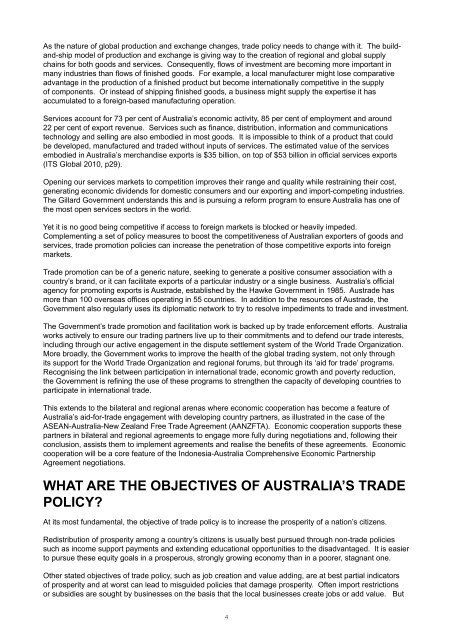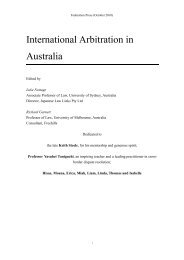Gillard Government Trade Policy Statement - Australian Industry Group
Gillard Government Trade Policy Statement - Australian Industry Group
Gillard Government Trade Policy Statement - Australian Industry Group
You also want an ePaper? Increase the reach of your titles
YUMPU automatically turns print PDFs into web optimized ePapers that Google loves.
As the nature of global production and exchange changes, trade policy needs to change with it. The buildand-shipmodel of production and exchange is giving way to the creation of regional and global supplychains for both goods and services. Consequently, flows of investment are becoming more important inmany industries than flows of finished goods. For example, a local manufacturer might lose comparativeadvantage in the production of a finished product but become internationally competitive in the supplyof components. Or instead of shipping finished goods, a business might supply the expertise it hasaccumulated to a foreign-based manufacturing operation.Services account for 73 per cent of Australia’s economic activity, 85 per cent of employment and around22 per cent of export revenue. Services such as finance, distribution, information and communicationstechnology and selling are also embodied in most goods. It is impossible to think of a product that couldbe developed, manufactured and traded without inputs of services. The estimated value of the servicesembodied in Australia’s merchandise exports is $35 billion, on top of $53 billion in official services exports(ITS Global 2010, p29).Opening our services markets to competition improves their range and quality while restraining their cost,generating economic dividends for domestic consumers and our exporting and import-competing industries.The <strong>Gillard</strong> <strong>Government</strong> understands this and is pursuing a reform program to ensure Australia has one ofthe most open services sectors in the world.Yet it is no good being competitive if access to foreign markets is blocked or heavily impeded.Complementing a set of policy measures to boost the competitiveness of <strong>Australian</strong> exporters of goods andservices, trade promotion policies can increase the penetration of those competitive exports into foreignmarkets.<strong>Trade</strong> promotion can be of a generic nature, seeking to generate a positive consumer association with acountry’s brand, or it can facilitate exports of a particular industry or a single business. Australia’s officialagency for promoting exports is Austrade, established by the Hawke <strong>Government</strong> in 1985. Austrade hasmore than 100 overseas offices operating in 55 countries. In addition to the resources of Austrade, the<strong>Government</strong> also regularly uses its diplomatic network to try to resolve impediments to trade and investment.The <strong>Government</strong>’s trade promotion and facilitation work is backed up by trade enforcement efforts. Australiaworks actively to ensure our trading partners live up to their commitments and to defend our trade interests,including through our active engagement in the dispute settlement system of the World <strong>Trade</strong> Organization.More broadly, the <strong>Government</strong> works to improve the health of the global trading system, not only throughits support for the World <strong>Trade</strong> Organization and regional forums, but through its ‘aid for trade’ programs.Recognising the link between participation in international trade, economic growth and poverty reduction,the <strong>Government</strong> is refining the use of these programs to strengthen the capacity of developing countries toparticipate in international trade.This extends to the bilateral and regional arenas where economic cooperation has become a feature ofAustralia’s aid-for-trade engagement with developing country partners, as illustrated in the case of theASEAN-Australia-New Zealand Free <strong>Trade</strong> Agreement (AANZFTA). Economic cooperation supports thesepartners in bilateral and regional agreements to engage more fully during negotiations and, following theirconclusion, assists them to implement agreements and realise the benefits of these agreements. Economiccooperation will be a core feature of the Indonesia-Australia Comprehensive Economic PartnershipAgreement negotiations.WHAT ARE THE OBJECTIVES OF AUSTRALIA’S TRADEPOLICY?At its most fundamental, the objective of trade policy is to increase the prosperity of a nation’s citizens.Redistribution of prosperity among a country’s citizens is usually best pursued through non-trade policiessuch as income support payments and extending educational opportunities to the disadvantaged. It is easierto pursue these equity goals in a prosperous, strongly growing economy than in a poorer, stagnant one.Other stated objectives of trade policy, such as job creation and value adding, are at best partial indicatorsof prosperity and at worst can lead to misguided policies that damage prosperity. Often import restrictionsor subsidies are sought by businesses on the basis that the local businesses create jobs or add value. But4



